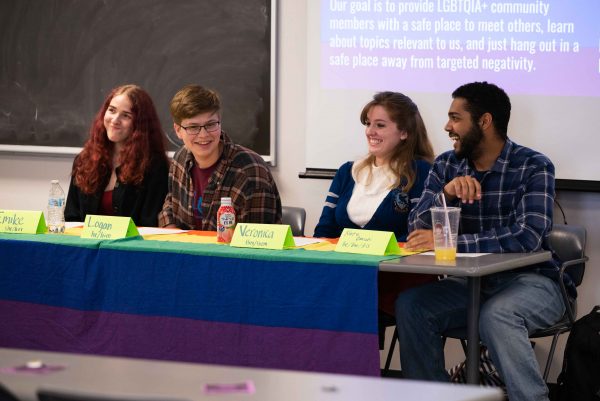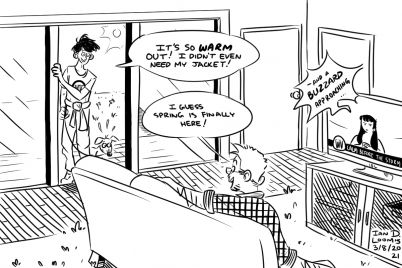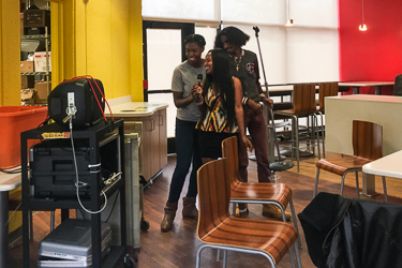
From left, panelists Emilee Seghi, Logan Gyolai, Veronica Zeimet and Nate Duncan share their experiences as LGBTQIA+ identifying individuals at WCC. Lily Merritt | Washtenaw Voice
By Lilly Kujawski
Editor
What is it like to attend Washtenaw Community College as a lesbian, gay, bisexual, transgender, queer, intersex, asexual/aromantic (or LGBTQIA+) student? A student panel presented by the WCC Out-Space club tackled this question and more, and the answer is not “one-size-fits-all.”
WCC has in place a preferred name procedure that allows students and college employees to display the name they use other than their legal first name on various records and systems. For students, this includes class rosters, WCC photo IDs, MyWCC and Blackboard. While this process is available for anyone, it can be particularly beneficial for transgender and non-binary students, staff and faculty whose legal name may not reflect their gender identity.
Even so, the system is not without its flaws. According to panelists, preferred names appear in parenthesis next to the legal name on class rosters. The class rosters also do not include the individual’s preferred pronouns; some examples of pronouns include: she/her/hers, he/him/his and they/them/theirs.
“The way WCC handles names and pronouns makes it somewhat confusing for faculty to actually understand what names and pronouns they should be using with their students,” said Syney Michalowski, an Out-Space club member and panelist.
Michalowski said the process to request a preferred name change, which requires a visit to the Student Connection office on the Student Center second floor, can be uncomfortable for students who may not want to “out” themselves as transgender or non-binary.
To help combat confusion for faculty, Sinay suggested preferred pronouns be included on class rosters, and legal first names be left off for students with a different preferred name, while still having that legal name accessible to teachers elsewhere.
Carol Wissel, a physics instructor at WCC and audience member, agreed, adding that from a faculty point of view it would make grading much easier if preferred names were used exclusively on rosters and class records.
Emilee Seghi, president of the Out-Space club, said if you don’t know someone’s pronouns, “just ask.”
“Make sure you don’t make, like, a show of it… Don’t do it in front of a bunch of people,” Seghi said. “Make sure it’s done in private and make sure you’re asking in a respectful way.”
Mary Mullalond, an English instructor and the faculty advisor for Out-Space, said that for some people, asking about pronouns can be difficult because it may be new to them.
“It’s kind of a new norm that we’re trying to establish, of it just being a manner of course that when you meet someone, one of the first questions isn’t, like, ‘Where do you come from?’ but is like, ‘Oh, what pronouns do you want me to use?’ and that that’s just kind of a natural part of a conversation,” Mullalond said.
Michalowski suggested first introducing your own pronouns if you’re unsure how to approach the subject when meeting someone new, which can also help someone in the LGBTQA+ community to feel more accepted and safe.
While learning someone’s pronouns and remembering to use them correctly takes practice and can be a learning process for some, Seghi said it’s important to remember that there is “something at stake” if the wrong pronoun is used.
Make an honest, best effort to get pronouns right and actively correct yourself if you do make a mistake, Duncan said.
Seghi said overall her experience at WCC has generally been a positive one. However, she did mention that some Out-Space fliers have been torn down by people in the past, which she described as more of an “atmospheric aggression,” as opposed to direct discrimination against her.
Seghi said she does wish to see more of the “subtle” reminders of support and acceptance around campus, such as rainbow pride stickers on teachers’ door.
“It really is little symbols of inclusion like that, that let LGBTQIA people know that they’re in a safe space,” Seghi said.
Panelists also explained some of the language used within the LGBTQIA+ community, including the term “outing,” which is when someone reveals information about another person’s sexual orientation without their consent.
A helpful way to respond if someone ‘comes out’ as LGBTQIA+ to you is to ask how you can better support them and if there’s anything they’d like you to change in your interaction with them, according to Michalowski.
“People in this community are human, and all they want is to have the rights to live and lead their lives they way they want to lead them,” he said. “They want to have a concrete sense of identity and feel accepted with that concrete sense of identity.”
The most important thing a non-LGBTQIA+ identifying individual can do to be a good ally is to be respectful, Seghi said.
“Respect LGBT decisions, respect LGBT lives, fight for LGBT lives, engage in activism wherever you can,” advised Seghi.
Michalowski added that anyone with a social privilege in their life, LGBTQIA identifying or not, should use that privilege lift others in the LGBTQIA+ community.
Logan Gyolai, another panelist, said it’s important to find a balance in advocating for the LGBTQIA+ community, but not speaking over it.
“Even if you want to help out LGBTQ+ people as an ally, I found it’s still really easy to, rather than uplifting them, to start to speak over them,” Gyolai said. “I know that lots of people who do that don’t mean to, they have good intentions, but it’s still not helpful.”


